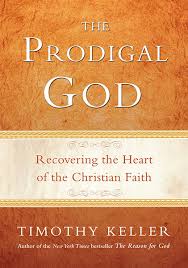c

TITLE: The Prodigal God: Recovering the Heart of the Christian Faith
AUTHOR: TIM KELLER
PUBLISHER: New York, NY: Dutton Press, 2008, (144 pages).
"The elder brothers of the world desperately need to see themselves in the mirror. Jesus aimed this parable primarily at the Pharisees, to show them who they were and to urge them to change. As we said, the younger brother knew he was alienated from the father, but the elder brother did not. That's why elder-brother lostness is so dangerous. Elder brothers don't go to God and beg for healing from their condition. They see nothing wrong with their condition, and that can be fatal. If you know you are sick you may go to a doctor; if you don't know you're sick you won't - you'll just die.
The younger brothers of this world also desperately need to see this. When we see the attitude of the elder brother in the story we begin to realize one of the reasons the younger brother wanted to leave in the first place. There are many people today who have abandoned any kind of religious faith because they see clearly that the major religions are simply full of elder brothers. They have come to the conclusion that religion is one of the greatest sources of misery and strife in the world. And guess what? Jesus says through this parable - they are right. The anger and superiority of elder brothers, all growing out of insecurity, fear and inner emptiness, can create a huge body of guilt-ridden, fear-ridden, spiritually blind people, which is one of the great sources of social injustice, war, and violence.
It is typical for people who have turned their backs on religion to believe that Christianity is no different. They have been in churches brimming with elder-brother types. They say, 'Christianity is just another religion.' But Jesus says, no, that is not true. Everybody knows that the Christian gospel calls us away from the licentiousness of younger brotherness, but few realize that it also condemns moralistic elder brotherness.
Our big cities are filled with younger brothers who fled form churches in the heartland that were dominated by elder brothers. When I moved to New York City in the late 1980s to begin a new church, I thought I would meet many secular people who had no familiarity with Christianity at all. I did, but to my surprise I met just as many people who had been raised in churches and in devout families and had come to New York City to get as far away from them as possible. " (66-8)
No comments:
Post a Comment